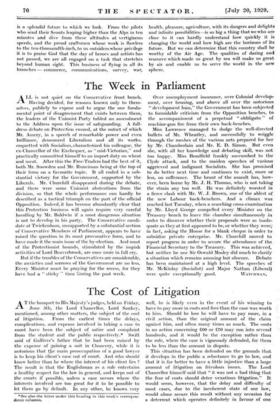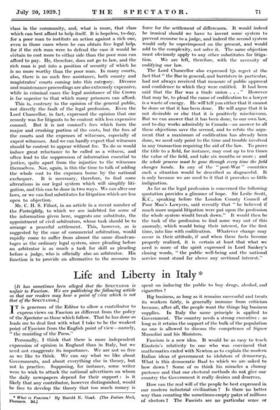The Cost of Litigation A T the banquet to His Majesty's
judges, held on Friday, . June 5th, the Lord Chancellor, Lord Sankey, mentioned, among other matters, the subject of the cost- of litigation.. From . the earliest times the delays, complications, and expense involved in taking a case to court have been the subject of satire and complaint from the student and the public respectively.* Swift said of Gulliver's father that he had been ruined by. the expense of gaining a suit in Chancery, while it is notorious that the main preoccupation of a good lawyer is to keep his client's case out of court. And who, should know better than he where the interest of his client lies ? The result is that the Englishman as a rule entertains a healthy respect for the law in general, and keeps out of the courts if possible, unleSs a case occurs where the interests involved are too great for it to be possible to let them go by default. In any other, he knows very • See also the letter under this heading in this weok's correspon- dence columns. well, he is likely even in the event of his winning to have to pay more in costs and fees than the case was worth to him. Should he lose he will have to pay more, in a civil action, than the original amount of the claim against him, and often many times as much. The costs in an action concerning £60 or £70 may run into several' hundreds, and it would be the exception rather than. the rule, where the case is vigorously defended, for them' to be less than the amount in dispute.
• This situation has been defended on the grounds that it develops in the public a reluctance to go to law, and that it is far better to have a little injustice than a large amount of litigation on frivolous issues. The Lord Chancellor himself said that " it was not a bad thing that the fear of costs should deter vexatious -litigation."' It would seem, however, that the delay and difficulty of most cases, due to the incoherent state of our law, would alone secure this result without any occasion for a deterrent which operates definitely in favour' of one 'class in the community, and, what is more, that class which can best afford to help itself. It is hopeless, to-day, for a poor man to institute an action against a rich one, even in those cases where he can obtain free legal help, for if the rich man were to defend the case it would be certain to cost more to either side than the poor man can afford to pay. He, therefore, does not go to law, and the rich man is put into a position of security of which he is no more worthy than the poor man. In many courts, also, there is no such free assistance, both county and magistrates' courts coming into this category. Divorce and maintenance proceedings are also extremely expensive, while in criminal cases the legal assistance of the Crown is far superior to that which many prisoners can afford.
This is, contrary to the opinion of the general public, not directly the fault of the legal profession. Even the Lord Chancellor, in fact, expressed the opinion that one remedy was for litigants to be content with less expensive counsel. But it is not counsel's fees which form the major and crushing portion of the costs, but the fees of the courts and the expenses of witnesses, especially of expert witnesses. And we can hardly expect that witnesses should be content to appear without fee. To do so would induce great reluctance to be called as a witness, and often lead to the suppression of information essential to justice, quite apart from the injustice to the witnesses themselves. Nor, again, is this the time to talk of adding the whole cost to the expenses borne by the national exchequer. It is necessary, therefore, to find some alterations in our legal syStem which will simplify liti- gation, and this can be done in two ways. We can alter our laws, or we can find substitutes for litigation which are less open to objection.
Mr. C. H. S. Fifoot, in an article in a recent number of the Fortnightly, to which we are indebted for some of the information given here, suggests one substitute, the appointment of civil arbitrators, whose task should be to arrange a peaceful settlement. This, however, as is suggested by the case of commercial arbitration, would rapidly come to suffer from almost the same disadvan- tages as the ordinary legal system, since pleading before an arbitrator is as much a task for skill as pleading before a judge, who is officially also an arbitrator. His function is to provide an alternative to the recourse to force for the settlement of differences. It would indeed be ironical should we have to invent some system to prevent recourse to a judge, and indeed the second system would only be superimposed on the present, and would add to the complexity, not solve it. The same objection must obviously apply to any other substitutes for litiga- tion. We are left, therefore, with the necessity of codifying our law.
The Lord Chancellor also expressed his regret at the fact that " the Bar in general, and barristers in particular, had not always received that measure of public approval and confidence to which they were entitled. It had been said that the Bar was a trade union . . . " However that may be, to plead the cause of codification to a lawyer is a waste of energy. He wilrtell you either that it cannot be done or that it has been done. He will argue that it is not desirable or else' that it is positively mischievous. But we can answer that it has been done, to our own law, and to-day works admirably in Canada—an answer to all these objections save the second, and to refute the argu- ment that a maximum of codification has already been done, we need only point to the time and trouble involved in any transaction requiring the aid of the law. To prove the title to a field, for instance, may cost up to ten times the value of the field, and take six months or more ; and the whole process must be gone through every time the field changes hands. In any of the " post-War " countries such a situation would be described as disgraceful. It is only because we are used to it that it provokes so little indignation.
As far as the legal profession is concerned the following quotation provides a glimmer of hope. Sir Leslie Scott, K.C., speaking before the London County Council of Poor Man's Lawyers, said recently that " he believed if much more unpaid litigation were put upon the profession the whole system would break down." It would then be the task of the profession to find some way out of this anomaly, which would bring their interest, for the first time, into line with codification. Whatever change may occur in their attitude, if and when these facts become properly realized, it is certain at least that what we need is more of the spirit expressed in Lord Sankey's closing words, " the public well-being and the national service must stand far above any sectional interest."

















































 Previous page
Previous page